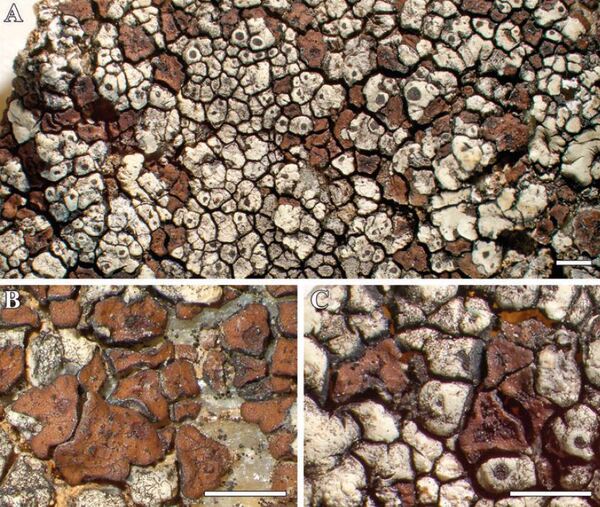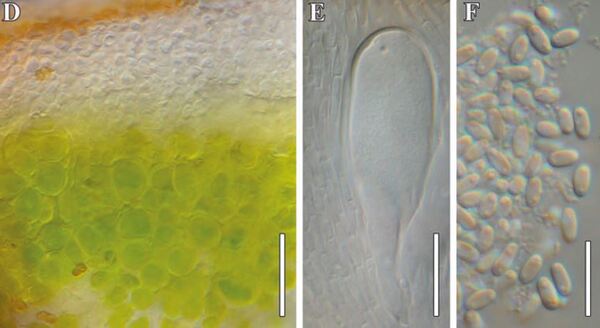Acarospora mayrhoferi K.Knudsen & Kocourk.
Herzogia, 31: 511, 2018
Synonyms:
Distribution: N - TAA (Knudsen & Kocourková 2018, Knudsen & al. 2021), VA (Knudsen & Kocourková 2018).
Description: Thallus crustose, episubstratic, of scattered to contiguous, brown, epruinose, 0.5-1 mm wide, 0.35-0.55 mm thick, often black-edged areoles developing on the thalli of Dimelaena oreina. Cortex 25-40 μm thick, dark reddish brown in upper part, colourless in lower part; algal layer continuous under apothecia, uneven to even, intermixed with perpendicular hyphae, but not interrupted by distinct hyphal bundles; medulla thin, white. Apothecia lecanorine, immersed in the areoles, 1(-2) per areole, with a punctiform to slightly expanded, to 0.5 mm wide, dark brown, often rugulose, epruinose or lightly pruinose disc. Proper exciple narrow, c. 10 μm thick; epithecium reddish brown; hymenium colourless, 90-140 μm high, the hymenial gel euamyloid, IKI+ persistently dark blue; paraphyses c. 2 μm thick at mid-level, the apical cells up to 4 μm wide; hypothecium colourless. Asci 100-200-spored, clavate, the apical dome K/I-. Ascospores 1-celled, hyaline, broadly ellipsoid to globose 2-3 x 2 μm, or ellipsoid, 4-5 x c. 2 μm. Photobiont chlorococcoid. Spot tests: cortex and medulla K-, C-, KC-, P-, UV-. Chemistry: without lichen substances.
Note: A recently-described species which grows parasitically on the thalli of Dimelaena oreina, hitherto known only from the Southern Alps (France, Italy).
Growth form: Crustose
Substrata: rocks
Photobiont: green algae other than Trentepohlia
Reproductive strategy: mainly sexual
Subcontinental: restricted to areas with a dry-subcontinental climate (e.g. dry Alpine valleys, parts of Mediterranean Italy)
Paras Dimelaena oreina
Commonnes-rarity: (info)
Alpine belt: extremely rare
Subalpine belt: extremely rare
Oromediterranean belt: absent
Montane belt: very rare
Submediterranean belt: extremely rare
Padanian area: absent
Humid submediterranean belt: absent
Humid mediterranean belt: absent
Dry mediterranean belt: absent

Predictive model
Growth form: Crustose
Substrata: rocks
Photobiont: green algae other than Trentepohlia
Reproductive strategy: mainly sexual
Subcontinental: restricted to areas with a dry-subcontinental climate (e.g. dry Alpine valleys, parts of Mediterranean Italy)
Paras Dimelaena oreina
Commonnes-rarity: (info)
Alpine belt: extremely rare
Subalpine belt: extremely rare
Oromediterranean belt: absent
Montane belt: very rare
Submediterranean belt: extremely rare
Padanian area: absent
Humid submediterranean belt: absent
Humid mediterranean belt: absent
Dry mediterranean belt: absent

Predictive model
 INDEX FUNGORUM
INDEX FUNGORUM
 GBIF
GBIF
 DOLICHENS
DOLICHENS



